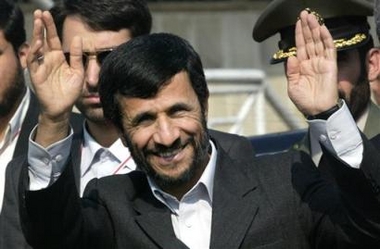Iran's president on Thursday intensified his attacks against Israel, calling
it a "regime based on evil," but also said he was ready to negotiate with the
United States and its allies over his country's nuclear program.

Iranian President
Mahmoud Ahmadinejad waves as he arrives to pay respect at the Heroes
Cemetery, where Indonesian soldiers are buried Thursday, May 11, 2006, in
Jakarta, Indonesia. Iran's president accused Western powers of double
standards in their campaign against his country's nuclear program, and
said he was ready to negotiate with any country to resolve the dispute,
but said that any threats against his country would make talks difficult.
[AP] |
Mahmoud Ahmadinejad, who has previously said Israel should be wiped off the
map, also told a cheering crowd of students in Indonesia's capital that the
Jewish state "cannot continue and one day will vanish."
Students held up posters saying "Iran in our Hearts," and "Nuclear for
Peace."
Ahmadinejad, known for his fiery rhetoric, is visiting Indonesia amid a
deepening standoff over his country's nuclear program and suspicions it is
developing nuclear weapons. This week, key U.N. Security Council members agreed
to present Tehran with a choice of incentives or sanctions in deciding whether
to suspend uranium enrichment.
The move will delay a draft U.N. resolution that could lead to sanctions and
possible military action if Iran does not suspend uranium enrichment.
The United States accuses Iran of seeking to develop nuclear weapons, a
charge Tehran denies, saying it aims only to generate energy.
The Iranian leader told Indonesia's Metro TV station Thursday he was
unconcerned about the possibility of U.N. sanctions, saying the West had more to
lose than Iran did if the country was isolated.
"We do not need to be dependent on others," he said, adding international
isolation would serve only to "motivate" the country's nuclear scientists.
He also said that Western nations with large stocks of nuclear weapons were
practicing "double standards" in pressing Iran to stop its peaceful nuclear
program.
Asked what it would take to begin talks with the United States to resolve the
standoff, he said Tehran would talk to anyone except Israel, which Iran does not
recognize.
"There are no limits to our dialogue," he said. "But if someone points an arm
(a weapon) at your face and says you must speak, will you do that?"
Israeli officials have described Iran's nuclear quest as the Jewish state's
greatest threat. Israeli Vice Premier Shimon Peres' warning on Monday that Iran
could be threatened with destruction if it continues to vow to destroy Israel.
Despite Ahmadinejad's hardline rhetoric, there were hints of a possible
solution to the escalating international crisis from other quarters.
In a letter to Time magazine published on its Web site Wednesday, a
representative of Supreme Leader Ayatollah Ali Khamenei offered new
possibilities for solving the impasse with the United States and its allies on
the issue.
Hassan Rohani, Iran's former top nuclear negotiator, said Tehran would
consider ratifying an International Atomic Energy Agency protocol that provides
for intrusive and snap inspections and would also address the question of
preventing a pullout from the Nuclear Nonproliferation Treaty.
Sean McCormack, the State Department spokesman, said of the Time magazine
letter, "We've seen it. ... I think there really isn't anything new in it." He
said the letter does not deal at all with enrichment.
The current Iranian negotiator, Ali Larijani, said Tuesday that Tehran had no
intention of withdrawing from the treaty and promised to cooperate if the U.N.
atomic watchdog, instead of the Security Council, dealt with the issue of its
nuclear program.
Iran ended all voluntary cooperation with the IAEA in February, including
allowing snap inspections of its nuclear facilities.
Ahmadinejad told reporters Wednesday that Iran will "absolutely not back out"
of defending its right to pursue new technology.
"They (Western powers) pretend that they are concerned about the nature of
the nuclear program of the Islamic republic of Iran," he said after meeting with
Indonesian President Susilo Bambang Yudhoyono. "This is a big lie."
At a meeting Tuesday, representatives of the United States, Russia, China,
Britain and France as well as Germany agreed to tell Iran the possible
consequences of its refusal to halt its enrichment program and the benefits if
it abandons it.
Secretary of State Condoleezza Rice said Wednesday she and her counterparts
on the U.N. Security Council agreed to give Iran another two weeks to reconsider
its position.
"We agreed to continue to seek a Security Council resolution but that we
would wait for a couple of weeks while the Europeans design an offer to the
Iranians that would make clear they have a choice that would allow them to have
a civil nuclear program, if that is indeed what they want," Rice said on ABC's
"Good Morning America."
The Chinese and Russians have balked at the British, French and U.S. efforts
to put the resolution under Chapter 7 of the U.N. Charter. Such a move would
declare Iran a threat to international peace and security and set the stage for
further measures if Tehran refuses to comply. Those measures could range from
breaking diplomatic relations to economic sanctions and military action.
Representatives from the three European countries that had been spearheading
negotiations with Iran ¡ª Britain, France and Germany ¡ª will now spend the next
few days preparing a package of incentives and sanctions, a European official
said, speaking on condition of anonymity because there has been no official
announcement.
The official said the package is likely to include issues related to energy
security and civilian nuclear power. The package will be presented to European
Union foreign ministers on the sidelines of an EU meeting in Brussels on Monday,
and if approved will be presented to the Iranian government, the official
said.